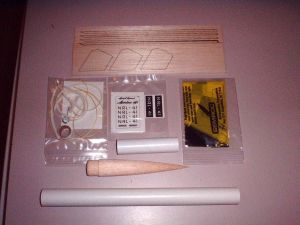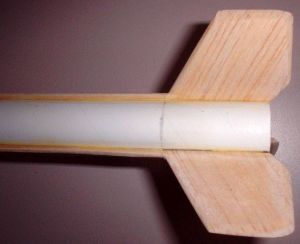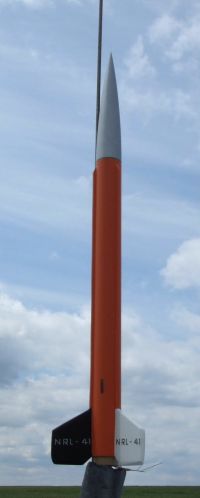| Construction Rating: | starstarstarstarstar_border |
| Flight Rating: | starstarstarstarstar |
| Overall Rating: | starstarstarstarstar_border |
| Diameter: | 0.83 inches |
| Length: | 14.00 inches |
| Manufacturer: | Semroc  |
| Skill Level: | 1 |
| Style: | Scale |
Brief:
The Aerobee-Hi was the first production model offered my Model Missiles Inc. (MMI), and was introduced just about 50 years ago from the time this review is likely to be posted. The original version featured a maple nose cone, parallel-wound tubes, and sold for $7.95. 50 years later, Semroc has gone with balsa nose cone, upgraded to laser-cut fins and Kevlar shock cord, while keeping the price down to $11.50 retail (NAR members receive a discount when ordering direct from Semroc).
I had originally received a free version of this kit at NARAM-47 in Cincinnati back in the summer of 2005, but since it was a special commemorative package, I decided to keep it. When I received another free version at NARCON in 2008, I commented that I hardly thought this one was "free", since having two in my collection meant I still could not build one so I wound up having to buy one at NARCON without the commemorative packaging.
Construction:
Parts are typical top notch Semroc quality and include balsa nose cone, laser-cut fins and strakes, ST-730 body tube, 18mm motor tube, motor block, 12" plastic chute, Kevlar/elastic shock cord and a set of waterslide decals.

Instructions are very well done with plenty of good computer illustrations and consist of 19 steps including surface prep. The kit is rated a skill level 1, and I would agree that this is a quick, simple build though the perfectionist could spend a little time working on stuff like fin seams.
Construction starts with the motor mount. Tie the Kevlar shock cord to the motor block then glue the block inside the 18mm tube, and you're done. Note that there is no metal hook on this, so you must use tape/friction fit. The completed motor mount is then bonded inside the ST-730 body tube.
The fins are laser cut balsa and consist of three main fins with three long strakes. The instructions call for binding the fins first then the strakes, however, I cheated and bonded the fins to the strakes before attaching to the body tube. This allowed me to get them perfectly aligned. It also made it much easier to fill the tiny seam between the two pieces.
 With the fins in place, all that's left is attaching the tiny launch lugs then gluing a screw eye into the nose cone.
With the fins in place, all that's left is attaching the tiny launch lugs then gluing a screw eye into the nose cone.
Finishing:
Finishing on this is probably a bit tricky for a skill level 1 kit, mainly because of the somewhat challenging paint masking. I started off with my usual Elmer's Fill 'n' Finish for spirals and grains then a coat of Plastikote gray primer.
After sanding off most of the primer, I followed up with two more thin coats. However, this time I used white primer. I then pulled the nose cone off for separate treatment--gloss black base followed by a silver gloss finish. The black undercoat helps set the silver off more.
The rocket itself got a couple coats of gloss white. Then I masked off the two fins that would remain white, shot the body with orange, then masked off everything but the one fin that would be black. I say the masking is tricky, because the lines are right at the fin/strake joint, which is a tiny area to mask.
Once everything is dry, I applied the waterslide decals. One set is for the black fin and as such, is white lettering on a black decal background. Be careful to cut this one as close to the white lettering as possible since it will surely have more of a gloss than the paint underneath.
Construction Rating: 4 out of 5

Flight:
First flight on a very breezy day was on a B6-4 as the wind was also blowing towards the lake about 500 yards away. The flight was very nice with a slight weathercock into the 10-12 mph winds but otherwise straight and with no roll.
Ejection would have been perfect on a 100% vertical path but was about a half second late on this flight.
Recovery:
I was stupid but managed to catch a slight break. Somehow in constructing the parachute, I managed to attach two of the six shroud line ends to the same point on the chute (at least on opposite sides though--I'm not that stupid). That left me with a very sub-optimal chute so it came down fairly fast, but it landed on very soft grass. Recovery walk was short, and the threat of a water recovery was eliminated.
Flight Rating: 5 out of 5
Summary:
I really like the look of this semi-scale rocket. Pros are nice styling and quality parts. If I had to pick a con, I'd go really picky and wish for a decal on the black fin that is just white lettering over clear, not over black as it contrasts just a bit with my black paint. Maybe I'm using the "old" black and Semroc used the "new" black?
Overall Rating: 4 out of 5
Other Reviews
- Semroc Aerobee-Hi By Christopher Rhodes (March 24, 2008)
Brief: As my first attempt at constructing a real scale rocket, I chose the Aerobee Hi for my entry in the 2008 EMRR Challenge. The Aerobee Hi rocket is of a simple design and so looked like a mountable challenge. Being the first mass produced rocket kit, it also has some history behind it and would be easy to fly on a small motor. The Aerobee Hi consists of a simple single stage ...
 |
 |
Flights
 |
 |
Sponsored Ads
 |
 |













B.W.P. (May 6, 2008)